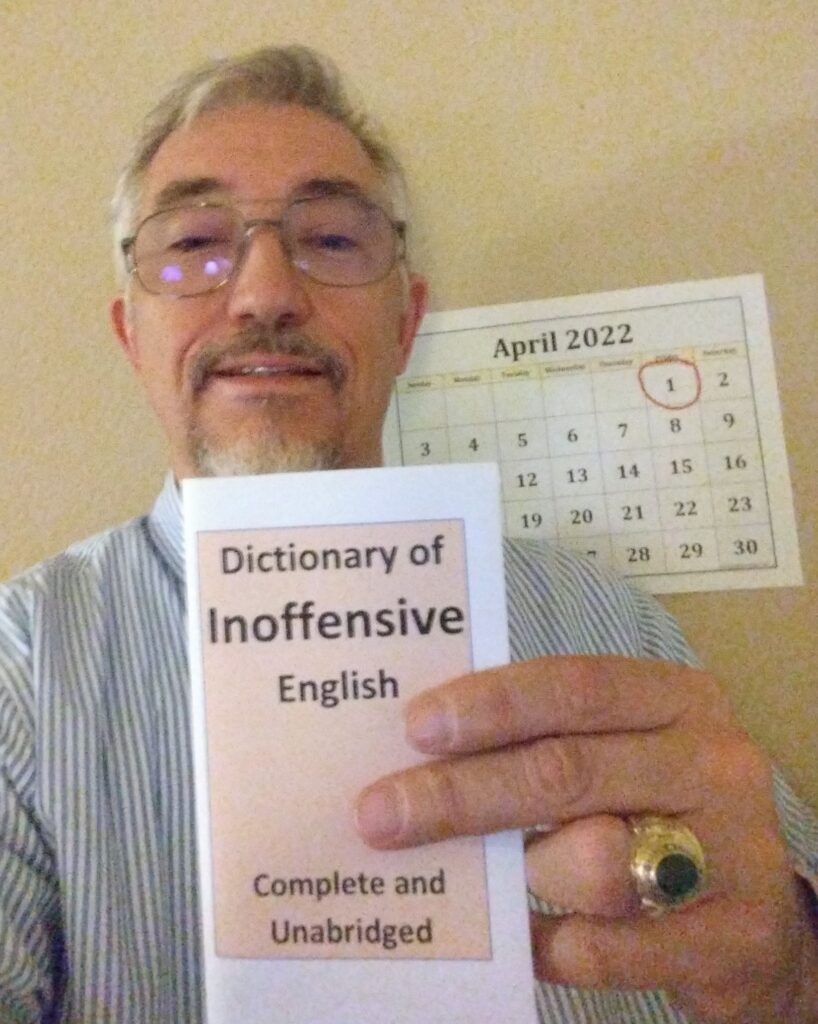The Association Promoting Rational Improvement of Language just revealed its Focus On Offensive Language initiative, and I’m a fan.
Linguists have long asserted that language determines thought. The Association intends to change our language so speakers and writers can’t convey an offensive word or sentence. In time, it would then become impossible to think an offensive thought.
The Association has made progress toward this goal. They’ve persuaded all major publishers of English dictionaries to remove offensive words from their lexica, beginning this year.
Just today, the U.S. House of Representatives passed H.R. 0401, which calls for starting the process of language improvement early next fiscal year, with full implementation occurring in early April 2025. The prospects for the bill’s passage in the Senate and becoming law look promising.
According to Sue Donim, a spokesperson for the Association Promoting Rational Improvement of Language, “Our new Focus On Offensive Language initiative plans to change present-day English into ‘Inoffensive English.’ We’ll begin by eliminating seven categories of offensive words from the dictionary so such words will fall out of usage.”
- Swear words. Eradicating profanity will greatly reduce the chance of offending others.
- Mental condition words. Words like insane, cuckoo, fool, and their many synonyms will vanish from dictionaries so they no longer offend.
- Gender words. Gender-based pronouns are already on the way out, and this initiative will hasten that. Also marked for elimination are nouns such as man, woman, boy, girl, etc. This will also include all words containing these gender-based words, such as mental and manatee.
- Racial words. Any words used to separate people by race will vanish from dictionaries and from common usage. In time, this will include all colors describing human skin hues. That sector of the color wheel will not contain names for those tones.
- Sexual words. All words having anything to do with intercourse or reproduction, or sexual orientation, must go, as these often cause offense.
- Age words. Since words like codger and whipper-snapper can be offensive, all words relating to human age will be stricken.
- Negative words. Words expressing negativity, like hate, detest, abhor, loathe, dislike, despise, disagree, etc. will go away. No longer will English speakers be able to use these to cause offense.
One exception to number 7 will be the word offensive itself. It must be allowed to linger on for a time, if only to mark additional words for eventual deletion from the language. By 2025, offensive, too, will depart the dictionary since that adjective will describe a state of being that no longer exists, or can even be imagined.
Aside from the obvious benefit of weeding offensive words from the language and rendering future English-speakers incapable of thinking offensive thoughts, consider that the dictionary will be smaller and the language easier to learn.
Detractors of this initiative wonder about past texts written in, or translated into, English. They question what will happen when future readers come across quotes like:
- “I’ve never met a man so ignorant that I couldn’t learn something from him.”
- “Hate cannot drive out hate—only love can do that.”
- “Frankly, my dear, I don’t give a damn.”
- “Familiarity breeds contempt.”
- “Ignorance is bliss.”
- “Hell has no fury like a woman scorned.”
To speakers of Inoffensive English, these quotes contain words they won’t understand. So what? Most of us can’t read Chaucer, either.
Further, it will be impossible even to translate these quotes into Inoffensive English. The point is, future English speakers won’t even be capable of thinking the thoughts those quotes convey.
A better world, I say. Bring it on. Kudos to the Association Promoting Rational Improvement of Language and its Focus On Offensive Language initiative. If there’s one writer who wouldn’t dream of offending anyone, it’s—
Poseidon’s Scribe

